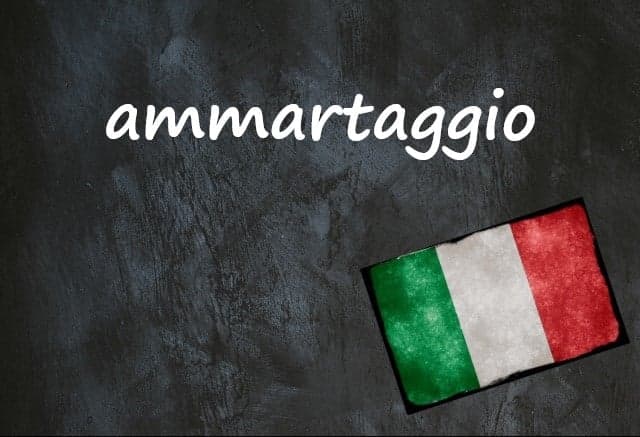
Italian word of the day: 'Ammartaggio'

You may see this word in the Italian news today. Here's what it means and where it came from.
We've chosen today's word in honour of the successful landing of NASA's Mars rover Perseverance. You may have seen it in the Italian headlines:

Italian has a curious word for a ‘mars landing’ which isn’t just a compound noun: ammartaggio.
- Un ammartaggio perfetto
- A perfect Mars landing
Italian also has the noun allunaggio which, as you might be able to guess, is a moon (luna) landing.
- Credevo avessi detto che il primo allunaggio era un falso
- I thought you said the first moon landing was fake.
While the word ammartaggio will probably have very limited practical usage in your everyday life - unless you happen to work for NASA - it’s still helpful to know about this Italian construction.
It comes from the much more commonly-used word atterraggio, which simply means landing – sulla terra, or on earth.
The Mars version is derived from Marte, the Italian name for Mars, and the first usage is attributed to a news report in La Stampa in July 1976.
Following this logic you could presumably come up with words to mean landing on pretty much anything - although I'm told that aggiovaggio (Jupiter landing) is definitely not a real word.
You can also say l'atterraggio di Marte (literally: the landing on Mars).
If you wanted to use verbs instead to talk about landing on Mars, the Moon, or anything else, you’d say atterrare (to land)
- Vogliamo atterrare sulla Luna
- We want to land on the moon
- Siamo atterrati tardi la scorsa note
- We landed late last night
And instead of saying “making a descent” or “coming in to land,” you’d say facendo le manovre di atterraggio, literally: 'doing the landing manoeuvres'.
- Abbiamo appena iniziato le manovre di atterraggio a Roma
- We’ve just begun our descent into Rome.
So whether you’re dreaming of exploring outer space or arriving at Rome Fiumicino, we hope you’ll now feel a little more confident talking about it in Italian.
Do you have a favourite Italian word, phrase or expression you'd like us to feature? If so, please email us with your suggestion.
Comments (1)
See Also
We've chosen today's word in honour of the successful landing of NASA's Mars rover Perseverance. You may have seen it in the Italian headlines:

Italian has a curious word for a ‘mars landing’ which isn’t just a compound noun: ammartaggio.
- Un ammartaggio perfetto
- A perfect Mars landing
Italian also has the noun allunaggio which, as you might be able to guess, is a moon (luna) landing.
- Credevo avessi detto che il primo allunaggio era un falso
- I thought you said the first moon landing was fake.
While the word ammartaggio will probably have very limited practical usage in your everyday life - unless you happen to work for NASA - it’s still helpful to know about this Italian construction.
It comes from the much more commonly-used word atterraggio, which simply means landing – sulla terra, or on earth.
The Mars version is derived from Marte, the Italian name for Mars, and the first usage is attributed to a news report in La Stampa in July 1976.
Following this logic you could presumably come up with words to mean landing on pretty much anything - although I'm told that aggiovaggio (Jupiter landing) is definitely not a real word.
You can also say l'atterraggio di Marte (literally: the landing on Mars).
If you wanted to use verbs instead to talk about landing on Mars, the Moon, or anything else, you’d say atterrare (to land)
- Vogliamo atterrare sulla Luna
- We want to land on the moon
- Siamo atterrati tardi la scorsa note
- We landed late last night
And instead of saying “making a descent” or “coming in to land,” you’d say facendo le manovre di atterraggio, literally: 'doing the landing manoeuvres'.
- Abbiamo appena iniziato le manovre di atterraggio a Roma
- We’ve just begun our descent into Rome.
So whether you’re dreaming of exploring outer space or arriving at Rome Fiumicino, we hope you’ll now feel a little more confident talking about it in Italian.
Do you have a favourite Italian word, phrase or expression you'd like us to feature? If so, please email us with your suggestion.
Join the conversation in our comments section below. Share your own views and experience and if you have a question or suggestion for our journalists then email us at [email protected].
Please keep comments civil, constructive and on topic – and make sure to read our terms of use before getting involved.
Please log in here to leave a comment.